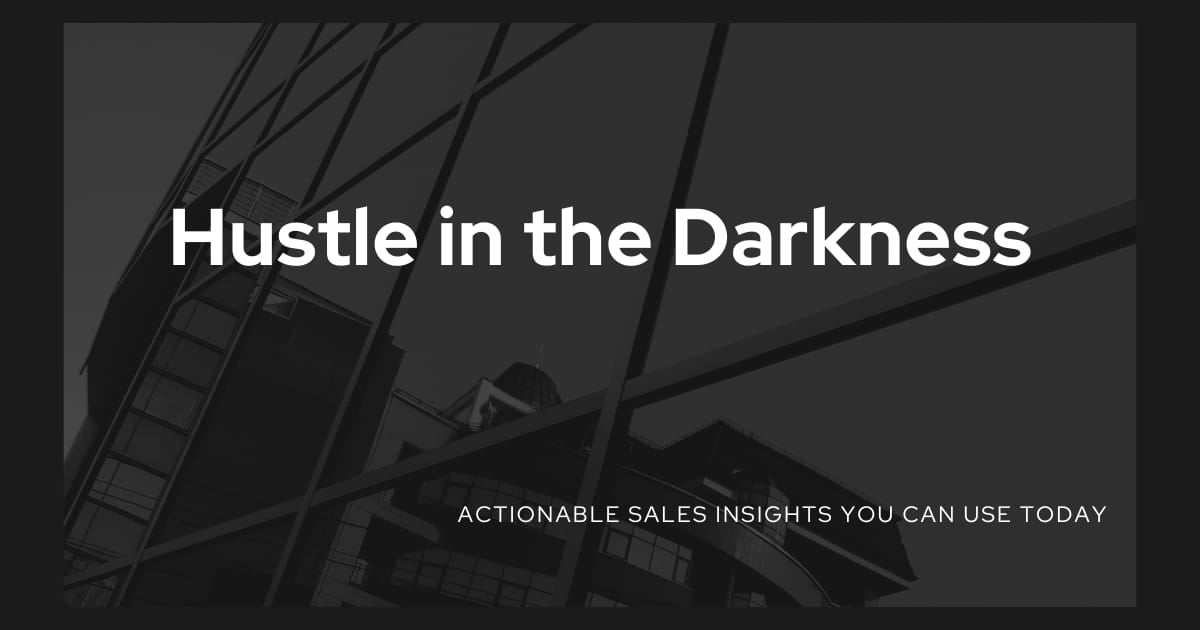Read on: My website
Read time: 2 Minutes
The relationship between the business development team and the proposal team is essential for your business.
Alignment on ideas, dates, what the customer needs, win themes, hot buttons, it all matters.
Context, depth, oversharing the who, what, when, where, and why all matter.
The tighter the bond and understanding between the two parties, the better the outcome.
When there is a disconnect or loss in translation, it can greatly affect the overall outcome of the proposal that lands in your customer’s hands.
No matter how well you know your customer, it means nothing if it doesn’t appear in your proposal.
The disconnect can have significant consequences unless addressed. And you sometimes might not see it until you find out at a final review, hear about your loss, or talk with your teams after the submission.
Was this newsletter forwarded to you?
Every lost deal has the same invisible root cause: a disconnect between the people with front-line insight and the people shaping your message on paper. Your deep industry intel is useless if the proposal reads like you just Googled the client last week.
This week, let’s break the silos and expose why the best customer knowledge still results in bland, forgettable submissions. More importantly, you’ll get one proven way to connect your expertise and your writers—so you start winning deals that used to slip away.
Let’s dance.
The Business Development/Proposal Disconnect
Here are some data to back this up:
Poor collaboration between technical and marketing teams is cited as a top reason for proposal failure
83% of proposal teams report communication gaps between business development and proposal writing teams
Companies with cross-functional collaboration in proposal development see 27% higher win rates than siloed approaches
68% of proposal managers identify "getting SMEs to contribute effectively" as their biggest challenge
Expertise in understanding a customer does not win on its own. Expertise in writing proposals does not win on its own. It is the fusion of both disciplines that drives wins. The proposal team and the business development team must collaborate, not compete. You need their skills. They need your knowledge. Stop assuming they can read your mind, move faster, or fix your gaps at the last minute.
I’ve written a few past newsletters on this, you can check them out here:
How the Disconnect Happens
Business development teams live and breathe the client, understanding decision makers, pain points, hidden needs, and competitor moves. That’s what you pay them for.
Proposal teams understand structure, compliance, persuasive writing, layout, and project management. And most importantly…due dates.
Stop assuming your proposal team can read your mind. Start ensuring they don't have to.
Why Traditional Handoffs Fail
The Email Brain Dump
BD sends a 47-page capture plan that proposal writers can't digest. Critical insights get buried in administrative details. Context gets lost in information overload.
The Meeting Marathon
Teams schedule endless "knowledge transfer" sessions that turn into unfocused conversations. Key points get missed. Action items remain vague. Follow-up is inconsistent.
The Assumption Game
BD assumes proposal writers understand customer nuances from brief explanations. Proposal writers assume they can fill gaps with standard responses. Both assumptions prove expensive.
The trouble starts when information is casually handed off by email, at a kickoff meeting, or a meeting that offers just vague notes, or each side expects the other to fill in what is missing on their own.
Or even the business development team does the bare minimum for preparation for getting through the gate reviews (I’ve seen it happen and know the feeling).
When all the information is kept internally to the BD team or a specific individual, it doesn’t help the others who will be supporting them later on in proposal preparation. Suppose all the knowledge of the customer is stored on their computer, or even worse, their own recollection of what they need. In that case, it slows down the speed and effeciency of developing a high-quality proposal.
Gate Reviews
Setting a standard at gate reviews is key. If limited information is provided or the right people are not there, it can lead to a growing wave of action items. If the standard and discipline at gate reviews are not set to provide deep content to decide if a specific opportunity should move on to the next stage, don’t allow a minimum amount of effort. Set a standard that makes it easier in the long run.
The more work and preparation you do upfront, the easier the smoother it will be in the long run.
These simple errors lead to missed messages, ignored insights, too many revision cycles, and incomplete storytelling. The final product becomes bland and generic.
The Last-Minute Panic
With deadlines looming, there's no time for iteration. Proposal teams write what they know instead of what customers need. BD reviews at the end when it's too late for major changes.
The Real Cost
Every proposal for a major contract has a cost associated with it to produce and deliver. Siloed teams deliver lower win rates, lose millions in missed business each year, and damage internal morale by repeating mistakes. The time lost in rework alone adds up to weeks per year, and $$$$$ down the drain.
The Real Cost of Disconnection
Immediate Revenue Impact:
Average proposal costs $25,000-$75,000+ to develop for major opportunities
Disconnected proposals win at 15-20% lower rates than collaborative approaches
Lost deals often represent $500K-$5M in missed revenue per opportunity
Long-term Relationship Damage:
Clients question your understanding of their business
Competitive positioning weakens for future opportunities
Internal team morale suffers from repeated losses
BD efforts get wasted on poorly executed proposals
Hidden Productivity Losses:
40-60 hours of rework per major proposal due to poor initial direction
3-5 revision cycles instead of focused first drafts
Proposal writers spend time researching what BD already knows
BD spends time explaining what could have been captured upfront
Ownership - A Way to Fix This
The remedy = Ownership needs to occur upfront. Expectations need to occur with the team. If there are already gate(s) review and capture plan material already developed, the content has been provided.
It is not the proposal team’s responsibility; it is the company’s responsibility to deliver it to the customer…aka it ain’t over till it’s been received by the customer.
So own the whole process, start to finish.
Whether you follow the Shipley methodology (or another process), it doesn’t mean anything else unless you actually do it. Just like Gate Reviews, follow them and be disciplined with them.
This means your sales/business development team needs to find the time to sit down and discuss strategy with the proposal team. Whether the proposal is coming out next month, next several months, or next week. Consistent build-up earns trust, lowers any potential blindside (and blind spots), prepare preliminary information now, and get administrative items done so the focus can be on the content of the proposal.
Be proactive with planning. I would recommend sitting down in the same room (not virtual) to drive as much information sharing as you can.
Afterward, schedule short check-ins at each proposal milestone. Both sides confirm the insights make it into the draft and answer any new questions.
Every day you operate with a proposal disconnect, you're leaving money on the table. Your competitors who figure out how to bridge the gap between customer knowledge and proposal execution will consistently outperform you, not because they have better capabilities, but because they demonstrate understanding that resonates with buyers.
What the Internet Taught Me This Week
From new tools, recent trends, and market updates, here is what has been on my mind.
Trump’s DOE proposes cutting billions in grants for GM, Ford, and lots of startups. Check it out here
OpenAI just announced a major Apps update within their platform. Check it out here
Google has made changes to its Search Engine Optimization, specifically the disabling of “num=100.” See how it might affect you. Check it out here
We all need to play in the same sandbox.
If you want more wins, make collaboration your default, not your afterthought.
The power of disconnect can have a significant impact on teams, win rates, opportunities, and customer engagement. Get out of the trap and get discipline on it.
See you next week.
Whenever You're Ready, Here are 4 Ways I Can Help You:
Unlocking Hidden Potential - Reconnecting with Past Clients for Explosive Growth - Check out my free eBook on how you can find hidden gems in your past clients and help you crush your sales goals.
Build your Sales CRM - Download our free Sales eBook on How Your Sales Team Can Maximize Your CRM Tool. Whether it’s Hubspot, Salesforce, or another CRM tool, make sure you leverage it to your advantage.
Awesome Sales Resources - Transform your sales engagement and capabilities across Social Selling, CRM, Lead Generation, Enablement, and more.
Cribworks Advisor Program - Want more than just resources? Reach out to me and see if our Advisor Program can help you grow your business.

